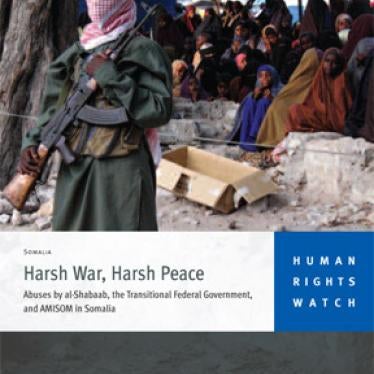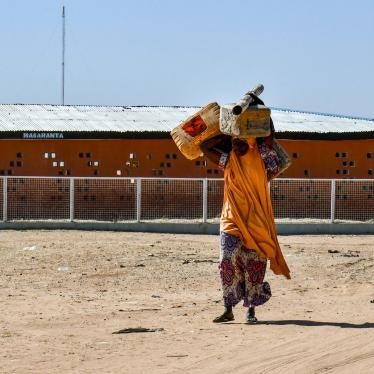(Nairobi) - Kenya should immediately stop deporting back to Somalia civilians fleeing the conflict there, Human Rights Watch said today. Kenya should allow humanitarian agencies to assist Somalis displaced by fighting and should not close makeshift camps without providing alternative sites and offering displaced people the opportunity to seek asylum.
On March 17, 2011, Kenyan authorities forced the Kenya Red Cross to stop providing services at a temporary refugee camp in Mandera, in northeast Kenya, which was housing 13,000 people, many of them Somalis who had recently fled fighting across the border in Bula Hawo. District authorities, who had given the Red Cross permission to establish the camp, abruptly changed course, ordering the Red Cross to stop providing services and close the camp. That evening, according to several organizations working in Mandera, government officials accompanied by armed Kenyan security forces intimidated camp residents, telling them to leave the camp and return to Somalia by noon the next day.
"Kenya's positive track record for taking in hundreds of thousands of Somali refugees over 20 years is marred by numerous recent incidents in which Kenya has forced Somali asylum seekers to go back to a place where their lives are in grave danger," said Rona Peligal, deputy Africa director at Human Rights Watch. "Kenya needs to work with humanitarian agencies to protect people displaced by conflict, not abandon them."
Kenya's border with Somalia has been officially closed since January 2007, but civilians fleeing the upsurge in fighting between the Transitional Federal Government (TFG) and the al-Shabaab militia in south-central Somalia have been arriving in Kenya in rising numbers. Since 2007 the Kenyan government has sporadically tried to return asylum seekers to Somalia against the advice of the United Nations High Commissioner for Refugees (UNHCR) and in violation of international refugee law.
The people in the Mandera camp were not given the opportunity to claim asylum, sources told Human Rights Watch. Some managed to stay with relatives in the town of Mandera, they said, but the majority returned to Somalia.
Human Rights Watch has also received reports from Kenyan journalists that Somalis who have crossed the border into Kenya near Liboi have been forcibly returned to the Somali town of Dobley in recent weeks, despite ongoing fighting there. A provincial official told Human Rights Watch that these people had not been returned, but were in police custody in Liboi. Any Somalis crossing the border at Liboi should be given the opportunity to claim asylum, Human Rights Watch said.
The provincial official also denied that the Somalis in Mandera had been forcibly returned, saying they had returned voluntarily when fighting abated across the border. He acknowledged that the government did not want a refugee camp in Mandera, but said that if "genuine refugees" arrived during future bouts of fighting, they would be encouraged to apply for asylum and settled at Kakuma refugee camp in northwestern Kenya.
However, several aid agencies and other sources in Mandera told Human Rights Watch that while some individuals may have chosen to return to Somalia, the mass return of thousands of refugees was, overall, far from voluntary. Several sources had spoken with Somalis who had expressed their intention to seek asylum in Kenya.
"Kenya should uphold the basic right of people fleeing violence and persecution to seek protection in Kenya," Peligal said.
Background
In June and again in December 2010, Human Rights Watch reported that Kenyan authorities were regularly deporting Somali asylum seekers.
Somalia is in the throes of one of the worst upsurges in violence in recent years. Offensives by the transitional government in alliance with militias and Ethiopian forces have targeted al-Shabaab-controlled areas beyond Mogadishu, the capital, in south-central Somalia. With the heightened military confrontation, the human rights situation remains critical, Human Rights Watch said.
The majority of Somalis fleeing violence in Somalia are housed in Dadaab refugee camps in northeastern Kenya. Dadaab was originally built to house 90,000 refugees, but it now has about 330,000. The camp facilities are under huge strain, and UNHCR, donors, and the Kenyan government have been locked in negotiations for nearly two years over the need for more land to expand the camps.
In March, the Kenyan authorities halted the construction of Ifo 2, a planned annex to the existing Dadaab camps to which 80,000 refugees were to be relocated. This is a major blow to the efforts of humanitarian agencies to assist the tens of thousands of people coming over the border seeking refuge from the dire situation in Somalia.
Kenya is bound by the 1951 UN Refugee Convention, the 1984 Convention against Torture, and the 1969 OAU Refugee Convention not to carry out refoulement, the forced return of refugees and asylum seekers to persecution, torture, and situations of generalized violence that seriously disturb public order. UNHCR advises governments not to return Somali civilians to south-central Somalia because they may face a "risk of serious harm" there due to widespread violations of the laws of war and large-scale human rights violations. The African Union Convention Governing the Specific Aspects of Refugee Problems in Africa, to which Kenya is a state party, not only prohibits refoulement, but also calls upon nations to receive refugees and secure their settlement.
In addition to international law and relevant regional treaties, Kenya's Refugee Act of 2006 also provides that any non-Kenyan in Kenya has the right not to be returned to a place where his or her "life, physical integrity, or liberty would be threatened on account of external aggression, occupation, foreign domination, or events seriously disturbing public order," and provides that such a person shall automatically be considered a refugee ("prima facie refugee").
Although the Kenyan government may lawfully deny refugee status for people who are threats to its national security, it cannot close its borders to all asylum seekers from a particular country. The Kenyan government is obligated under international law to offer the opportunity to seek refugee status to all asylum seekers before determining whether to return them.
Somali refugees registering in Dadaab with UNHCR are automatically granted refugee status in Kenya on a prima facie basis. But failure to register within 30 days may lead to prosecution for unlawful presence in Kenya.







